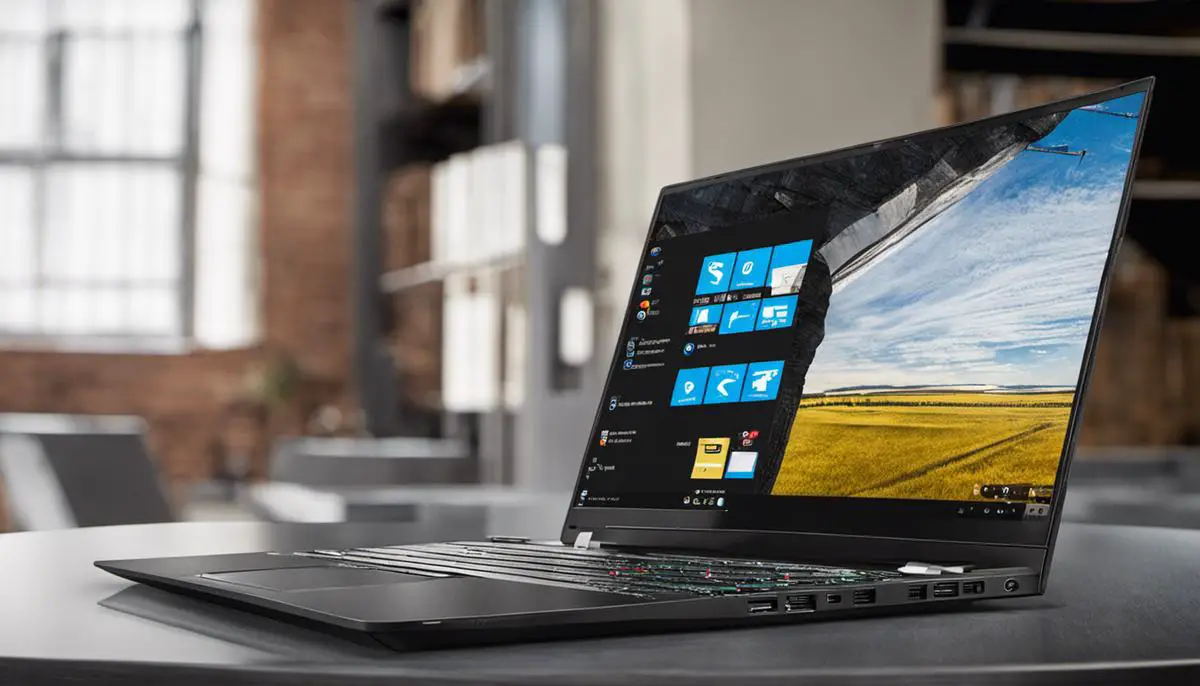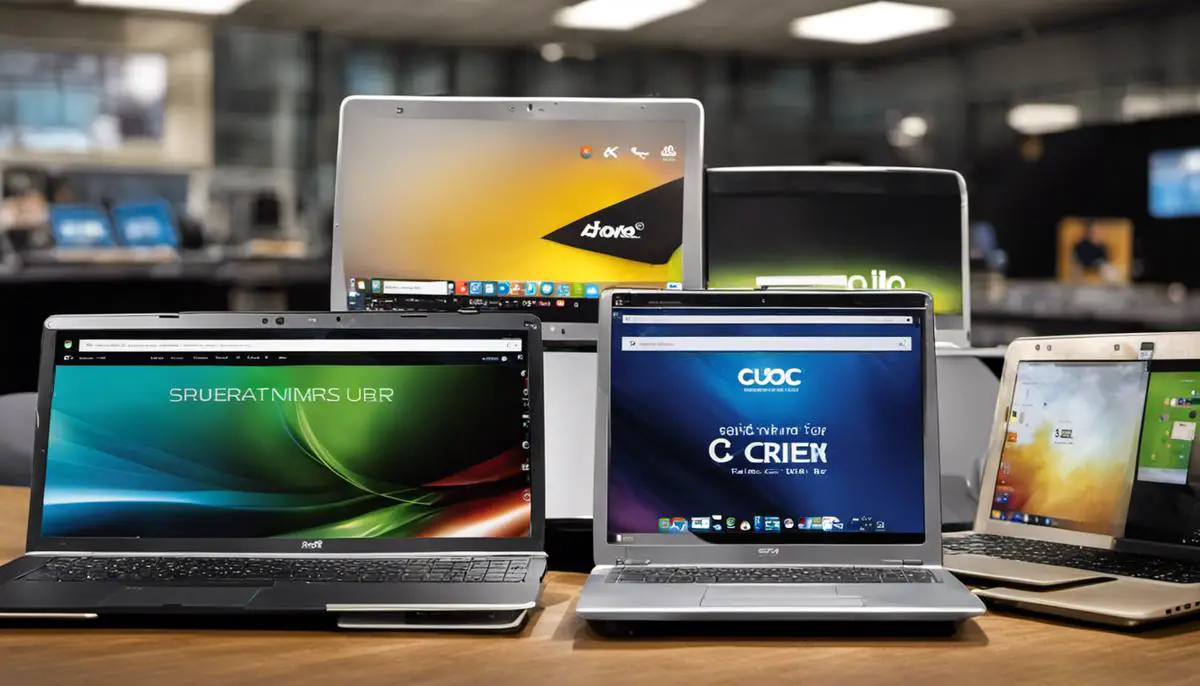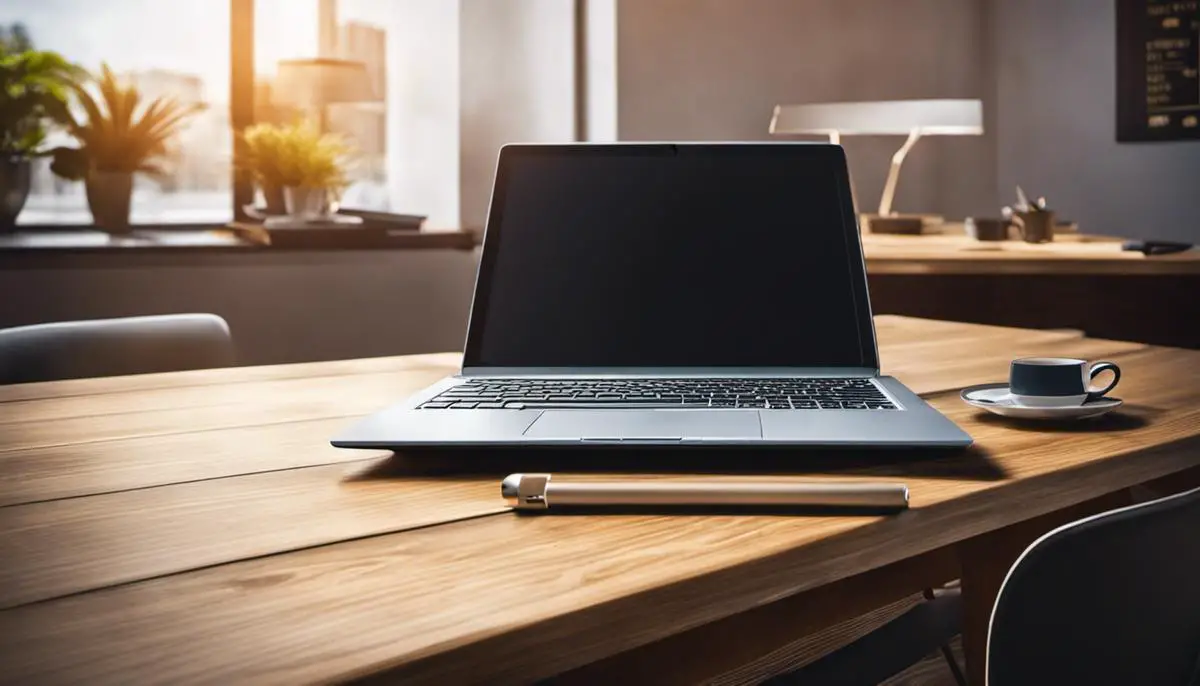As an experienced technology analyst, I understand the crucial role a reliable laptop plays in a student’s success. A modern student needs a laptop that can keep pace with their dynamic academic demands – from drafting essays and running complex software to facilitating virtual classrooms.
Thus, finding the right laptop is no less critical than picking the right major. In this article, we’ll navigate the labyrinth of the current laptop market, offering a comprehensive guide to help you find a laptop that fits your academic needs, lifestyle, and budget.
Let’s transform the daunting task of selecting your tech companion into a streamlined, informed decision.
- 1. Laying Out the Path Ahead
- 2. Understanding Hardware: A Refresher
- 3. Understanding Your Laptop Needs: A Student’s Guide
- 4. Importance of Comfort and Usability in Laptop Design
- 5. Laptop Durability: A Must for Student Use
- 6. Impact of Extracurricular Activities on Laptop Selection
- 7. Understanding the Importance of Battery Life
- 8. Best Laptops for Different Majors
- 9. Review of Top Laptop Brands Suitable for Students
- 10. Budgeting and Financing Options
- 11. Tips for Finding the Best Laptop Deals
- 12. Case Studies
- 13. Basic Laptop Maintenance Tips
- 14. Essential Laptop Accessories For Students
- Conclusion
- About the Author
THIS POST MAY CONTAIN AFFILIATE LINKS. As an Amazon Associate, I earn from qualifying purchases. PLEASE READ MY DISCLOSURE FOR MORE INFO.
As the frontier between how we learn and communicate becomes increasingly digitalized, students must be equipped with a laptop that caters to their unique needs and preferences.
1. Laying Out the Path Ahead
To help you navigate this complex landscape, I will be drawing on my extensive experience in the computer technology field, coupled with the insights I’ve gained from interacting with countless users and understanding their needs.
- There’s no one-size-fits-all solution when it comes to laptops for students. Each academic discipline has its unique set of requirements, making it vital to consider several factors such as processing power, memory, battery life, portability, and budget.
This comprehensive guide will take you through the process step-by-step. We will begin by identifying the key laptop features students should look for, followed by a comparison of some of the top models available in the market.
I will also share some case studies to shed light on real-life scenarios, helping you understand how the right laptop can enhance academic productivity.
By the end of this guide, you’ll not only have a clear understanding of what to look for in a laptop but also feel confident about making an informed buying decision.
Armed with the right knowledge, the prospect of buying a laptop will transform from an overwhelming challenge into an exciting opportunity.
2. Understanding Hardware: A Refresher
I firmly believe that today’s tech-savvy generation has a decent grasp of computer hardware. However, a little refresher never hurts. So let’s take a moment to revisit the basics – the heart (processor), the mind (RAM), and the soul (storage) of a laptop.
We’ll dive into what these fundamental components do and why they matter.
Following this, we’ll take into consideration the varying needs of different students – the art student requiring massive storage for their graphics-heavy projects, the computer science student needing a high-speed processor for their coding assignments, or the business student who primarily uses cloud-based applications and values portability and battery life above all.
We’ll also discuss how your budget factors into these decisions and guide you on how to make the most of your money.
Next, we’ll factor in lifestyle elements. Are you a gamer who enjoys unwinding with high-definition games after a long day? Or are you a travel enthusiast who prefers a light, sturdy laptop that can take a few knocks?
By the end of this section, you will have a clear idea of what your specific hardware needs are and how they fit into your budget and lifestyle.

A Closer Look at Your Laptop’s Anatomy
Let’s embark on a fascinating journey into the guts of your laptop, where we’ll decode the importance of each component in a language you’ll understand.
Think of it like a virtual tour of a city – each part of your laptop is a significant landmark with its own importance and function.
The Heart: Processor
The processor, or CPU (Central Processing Unit), is like the city mayor. It’s responsible for keeping everything running smoothly.
The faster your processor, the more tasks your laptop can handle simultaneously. To put it in perspective, imagine it’s finals week and you’re juggling multiple tasks – running a simulation for your physics project, while your music playlist streams in the background, and you have multiple browser tabs open for your ongoing research.
A high-speed processor, like Intel’s 11th Gen or AMD’s Ryzen series, will handle these tasks without breaking a sweat.
The Mind: RAM
RAM (Random Access Memory) is your laptop’s short-term memory. It’s like the city’s central library, holding the information your laptop needs right now.
The more RAM you have, the more applications you can run at the same time without your laptop slowing down.
For instance, if you’re a digital arts student working on a complex graphic design, more RAM will allow your software to run smoothly, even with high-resolution images.
The Soul: Storage
The storage is where your laptop keeps all your files and applications – it’s the city’s archive. There are two kinds – HDD (Hard Disk Drive) and SSD (Solid State Drive).
SSDs are faster, quieter, and more durable, making them ideal for students on the go. Think of it this way – you’re working on your thesis, and it’s saved on your laptop.
With an SSD, not only will your laptop boot up faster, but your files will also load quicker, saving you those precious minutes.
Nowadays, SSDs are the go-to choice for almost everything, making HDD drives less favorable.
Operating Systems: The City Manual
Choosing Your City’s Guidebook: Which Operating System is for You?
Deciding on an operating system is like choosing the right guidebook for your city. It will determine how you interact with your laptop city and navigate through your daily tasks.
Let’s look into the three major operating systems and see which one suits your needs the best.
Windows – If you prefer versatility and compatibility, Windows is an excellent choice. As one of the most widely used operating systems, Windows comes with a vast array of software options, making it suitable for students across various disciplines. It’s like having a guidebook with instructions for every imaginable scenario.
MacOS – MacOS, the exclusive guest at the Apple party, is the choice for you if you prefer a sleek interface, seamless integration with your iPhone or iPad, and a robust security system. It’s like using a specialized guidebook that offers in-depth knowledge of particular aspects of your city.
Chrome OS – Chrome OS, found on Chromebooks, is a lightweight contender that’s perfect for those focusing on basic tasks such as web browsing, word processing, or streaming content. It offers a fast, secure, and straightforward user experience, comparable to a concise guidebook that covers all the city’s highlights and must-see spots.
Remember, the most crucial aspect is that the operating system serves your needs and preferences. Just like choosing the right guidebook, the best OS for you will depend on what you study, how you intend to use your laptop, and your personal taste. With the correct operating system, your journey through the city of technology will be a breeze.
Note: If you’re an Apple user, you’re already tied to MacOS, given its exclusive presence on Apple devices. Similarly, if you have Windows machines at home, you’re likely accustomed to Windows OS. Remember, sticking to an OS you’re familiar with can greatly enhance your user experience and productivity. Don’t be afraid to factor in this familiarity when choosing your next laptop.
3. Understanding Your Laptop Needs: A Student’s Guide
Tailoring Hardware and Software to Your Course
So, why is tailoring your laptop’s hardware to your course essential? Think of your laptop as your primary tool in a craftsman’s kit. Just as a carpenter requires different tools for different tasks, your academic journey demands a laptop configured to match your course requirements.
For instance, if you’re studying graphic design, a laptop with a high-resolution display, robust graphics card, and substantial RAM will render high-quality images without lagging. It’s like having a sharp, precise chisel for detailed woodworking.
In contrast, if you’re a humanities student, your laptop is your writing tool, research companion, and multimedia device. A smooth keyboard for comfort during long writing sessions, a fast processor for efficient research, and a good display for viewing online lectures are your equivalents of a reliable hammer, saw, and screwdriver.
Remember, investing in a laptop that aligns with your course needs will not only streamline your learning process but also enhance your productivity and academic success.
Handpicked Laptops Tailored for Student Needs
Let’s delve into some specific laptop examples that cater to diverse student needs:
For Graphic Design Students: Apple MacBook Pro
The MacBook Pro, particularly the 16-inch model, is a standout option for graphic design students. Its high-resolution Retina display offers accurate colors and crisp visuals, ensuring your designs look as stunning on screen as they do on paper.
Paired with a powerful Intel i9 processor, up to 64GB of RAM, and AMD Radeon Pro 5500M graphics, this laptop can handle complex designs and multitasking with ease.
The seamless integration with Adobe Suite and other graphics software is another significant advantage.
For Engineering Students: Dell XPS 15
With its 10th Gen Intel i7 processor, up to 64GB of RAM, and Nvidia GeForce GTX 1650 Ti graphics, the Dell XPS 15 is well-equipped to handle engineering software like AutoCAD, MATLAB, and SolidWorks.
Plus, its InfinityEdge display supports 100% Adobe RGB color, ensuring your projects are displayed in vivid detail.
For Humanities Students: Microsoft Surface Laptop 3
Lightweight, portable, and boasting a comfortable keyboard, the Microsoft Surface Laptop 3 is a great choice for humanities students.
Its Intel i5 processor and 8GB of RAM are sufficient for research, note-taking, and multimedia use. The screen offers excellent resolution and color reproduction, making it a pleasure to use for both studying and relaxing with a Netflix movie.
For Computer Science Students: Lenovo ThinkPad X1 Extreme
ThinkPad X1 Extreme from Lenovo offers a balance of performance and portability ideal for computer science students.
It comes with an Intel i7 processor, up to 64GB of RAM, and a Nvidia GeForce GTX 1650 Ti GPU – all crucial for running programming IDEs and virtual machines.
The robust build quality and comfortable keyboard are perfect for long coding sessions.
Remember, these are just a few examples. There are many great laptops out there that can meet your academic needs. The key is to understand what you need from your laptop and choose one that fits those requirements and your budget.
4. Importance of Comfort and Usability in Laptop Design
The design of a student’s laptop can significantly affect ease of use and comfort, directly impacting their productivity.
- Lightweight: The lighter the laptop, the easier it is to carry.
- Keyboard: Look for a comfortable keyboard, preferably backlit, to make typing easier.
- Screen: A proper screen size and resolution can prevent eye strain. An anti-glare screen can be a bonus in brightly lit areas.
- Cooling System: A reliable cooling system can help prevent overheating during extended use.
5. Laptop Durability: A Must for Student Use
Since students carry laptops to various places like classes, libraries, or cafeterias, durability becomes an essential factor in choosing the right laptop.
- Build Quality: Tougher materials mean a tougher laptop.
- Water and Dust Resistance: This can protect your laptop from accidental spills and rough environments.
- Hinge Design: This is often the first thing to break, so make sure it’s sturdy.
- Warranty or Insurance: This can give you peace of mind in case of any problems.
6. Impact of Extracurricular Activities on Laptop Selection
Laptop requirements might vary depending on a student’s hobbies and personal preferences.
Personal Interests and Laptop Requirements:
- Gaming: You’ll need a high-performance laptop with dedicated graphics, good heat management, and a high refresh-rate display.
- Movies: Look for a laptop with a high-resolution screen and excellent sound quality.
- Photography: Consider a laptop with an accurate color display and speedy SD card readers.
7. Understanding the Importance of Battery Life
Never underestimate the importance of battery life. Your laptop should have enough juice to last a full day (8 to 10 hours) so you can work, study, or play without constantly needing to charge it. Factors such as screen size, resolution, and processor type can all affect battery life.
Considering a laptop with substantial battery life is crucial as it allows students the freedom to work, study, or enjoy their devices without the constant need to be plugged into a wall socket.
8. Best Laptops for Different Majors
Here is a list of majors and the recommended laptops for each based on the unique requirements of their respective programs:
- Business Students: HP Elite Dragonfly
Business students need a laptop that offers a balance between performance and portability. The HP Elite Dragonfly is lightweight, offers long battery life, and its robust security features make it a great choice for business students.
- Engineering Students: Acer Predator Helios 300
Engineering majors often require high-performance laptops to run complex applications. Acer Predator Helios 300 excels with its powerful 10th Gen Intel i7 processor and Nvidia GeForce GTX 1660 Ti GPU, making it ideal for engineering software.
- Art and Design Students: Microsoft Surface Book 3
Art and design students require a laptop with a high-resolution display and excellent color accuracy. The Microsoft Surface Book 3, with its detachable, high-resolution screen and accurate color reproduction, is a perfect fit.
- Medical Students: Asus Zenbook 13
Medical students need a device that’s easy to carry, has a long battery life, and can handle a multitude of open tabs and applications. Asus Zenbook 13, with its compact design and efficient performance, fits the bill.
- Law Students: Lenovo Yoga C940
Law students often have to work with text-heavy documents and multi-task extensively. The Lenovo Yoga C940 provides excellent performance, a comfortable keyboard for lengthy typing sessions, and a versatile 2-in-1 design.
- Computer Science Students: Razer Blade 15
Computer Science students need a laptop that can handle heavy programming and run virtual machines efficiently. The Razer Blade 15, with its powerful processor, ample RAM, and dedicated GPU, is a great option.
- Humanities Students: Google Pixelbook Go
Humanities students need a laptop for research, note-taking, and multimedia use. The Google Pixelbook Go is lightweight, has a fantastic keyboard, and offers smooth performance for everyday tasks.
- Architecture Students: MSI WS65 9TM
Architecture students need a high-performance laptop to run applications like AutoCAD and Revit. The MSI WS65 9TM, with its powerful processor, ample RAM, and dedicated GPU, can handle these demanding applications with ease.
- Anthropology Students: Apple MacBook Air
Anthropology students need a portable laptop with a strong battery life for fieldwork. The MacBook Air is lightweight, has excellent battery life, and the Retina Display makes for a great viewing experience.
- Environmental Science Students: Dell Latitude 7424 Rugged Extreme
Environmental Science students often work in the field, so a rugged, durable laptop is a must. The Dell Latitude 7424 Rugged Extreme is designed to withstand harsh conditions, making it perfect for this major.
- Education Students: Samsung Chromebook 4
Education students need a laptop that’s easy to carry, reliable, and budget-friendly. The Samsung Chromebook 4, with its lightweight design, reliable performance, and affordable price, is an excellent choice.
- Social Work Students: Asus VivoBook 15
Social work students need a reliable laptop for research and documentation. The Asus VivoBook 15 offers solid performance, a large display for multitasking, and comes at a budget-friendly price.
Please note that while these laptops are suggested based on the typical needs of these programs, individual requirements may vary. Always consider your specific needs and budget before making a purchase.

9. Review of Top Laptop Brands Suitable for Students
A brand’s reputation is often a reflection of its quality, customer service, and product durability. Some popular options include Dell, HP, Apple, Lenovo, and ASUS. Each of these brands offers unique features and values in their devices, catering to different needs.
I believe it would be beneficial to look into these brands, allowing you to gain a deeper understanding of each one and their unique identity.
Identifying Best Laptop Brands for Students
In the search for the ultimate student laptop brands, factors including but not limited to performance, reliability, battery longevity, durability, and cost-effectiveness are essential.
These criteria form the basis of distinguishing quality from standard when it comes to laptop brands ideal for student usage.
Apple
Apple laptops are known for their impressive performance, making them suitable for students who use demanding programs or applications in their studies.
The MacBook Pro, for example, features powerful processors and ample storage.
Apple laptops also offer reliability; their operating system (macOS) is stable and less likely to crash or lag. They boast lengthy battery life, generally lasting between 10-12 hours on a single charge.
In terms of durability, Apple’s iconic aluminum chassis is renowned for its resistance to wear and tear.
However, Apple laptops tend to be pricier than other brands; the MacBook Pro’s price can be quite steep for a student on a budget.
Dell
Dell offers a wide range of laptops that cater to different needs and budgets. For instance, the Dell Inspiron series offers decent performance and extended battery life at an affordable price.
Looking for durability? Dell’s XPS series is known for its rugged construction that can withstand daily wear and tear.
Though reliable, some users report that Dell laptops may experience occasional slowdowns, especially when running multiple applications simultaneously.
HP
HP is a brand that balances the scales between price and performance. The HP Pavilion, for instance, is frequently recommended for students thanks to its affordability and stellar performance.
Many of HP’s laptops come with a long-lasting battery life, while the company’s ProBook and EliteBook models are built for toughness.
However, some HP laptops may have less than optimal sound quality.
Lenovo
Lenovo is celebrated for making robust laptops that offer good value for money. Models like the Lenovo ThinkPad are renowned for their exceptional reliability and durability, thanks to their military-spec testing.
Performance-wise, Lenovo laptops tend to deliver thanks to their high-speed processors and adequate RAM.
However, some users note that certain Lenovo models have below-average battery life.
Discover a wide range of Lenovo laptops by visiting Lenovo’s Amazon Store.
ASUS
ASUS strikes an admirable balance between cost and features. The Asus VivoBook, for example, is priced reasonably yet offers robust performance, excellent battery life, and is sturdily built.
On the downside, some Asus laptops might be a tad heavy, which may not appeal to students who carry their laptops around campus.
The process of selecting a suitable laptop brand for students is influenced primarily by individual needs and budget constraints.
High-end brands such as Apple offer superior quality and performance, however, they may not be financially accessible to all students. Other brands such as Dell, HP, Lenovo, and Asus offer a spectrum of options at various price points, making them a more viable choice for a broader range of student requirements.
Discover a wide selection of ASUS laptops available at their Amazon Store.

10. Budgeting and Financing Options
In this section, we’ll guide you on how to navigate the financial aspect of purchasing a new laptop. We’ll discuss various price ranges and the features you can expect in each. We’ll also look into financing options, such as student discounts, payment plans, and credit card offers, which can make your purchase easier on your wallet.
Budgeting for a Laptop
When budgeting for a laptop, it’s essential to establish a clear understanding of your needs. Are you looking for basic functionality for note-taking and web browsing, or do you need a high-performance machine for design or coding tasks?
Here’s a rough guide to what you can expect at different price points:
- Budget Friendly: Under $500
At this price range, you can find laptops suitable for basic tasks such as web browsing, document editing, and streaming.
Chromebooks, like the Samsung Chromebook 4, are a popular choice in this category. These machines may not have high-end processors or large storage capacities, but they are perfect for students who only need basic functionalities.
- Mid-range: $500-$1,000
The mid-range price segment offers a balance between cost and performance.
Laptops in this price range, such as the Asus VivoBook 15, often come with competent processors and adequate storage capacity for most student tasks, including multitasking and running demanding software.
- High-end: Above $1,000
High-end laptops like Apple’s MacBook Pro or Dell XPS offer superior performance, high-quality displays, and ample storage.
These laptops are suitable for students with demanding tasks such as video editing, 3D modeling, or gaming.
Financing Options for Students
Most students operate on a tight budget, so financing options can be a lifesaver. Here are some popular options that you can explore:
- Student Discounts
Many manufacturers offer student discounts on their laptops. Apple, for instance, offers education pricing, not only for students but also for teachers and parents buying for students. Similarly, Dell provides a student discount via Dell University.
- Payment Plans
Check if your laptop manufacturer offers a payment plan. For example, Apple offers a monthly payment plan for MacBook Pro purchases, allowing you to spread the cost over several months.
- Credit Card Offers
Some credit card companies partner with laptop manufacturers to offer special financing deals. Ensure you understand the terms and conditions before opting for this route — sometimes, interest rates can be high if you don’t pay off the balance within a specified time period.
Remember, the most critical part of choosing a laptop is to identify what you need it for. Once you understand your requirements, it becomes significantly easier to determine a budget and financing plan that suits you.
11. Tips for Finding the Best Laptop Deals
Scoring the best deal on a laptop requires a bit of savvy shopping. Be sure to check out deals during major sales events such as Black Friday, Cyber Monday, and Amazon Prime Day.
Companies often provide significant discounts on these days. Also, keep an eye out for back-to-school sales in August and September.
Here are some additional tips to help you get the best value:
- Compare Prices: Before you make a purchase, compare prices across different online and physical retailers to ensure you’re getting the best possible deal.
- Read Reviews: User reviews can provide valuable insight into a laptop’s real-world performance. They can alert you to potential issues that you may not have considered.
- Check the Specs: Make sure the laptop’s specifications match your needs. A cheap laptop might seem like a great deal, but it won’t be if it doesn’t have the processing power, memory, or other features you need.
- Consider Refurbished Models: Manufacturers and retailers often sell refurbished laptops at a significant discount. These machines are usually just as good as new ones, but it’s important to check the warranty and return policy.
Why Amazon is a Good Choice
Amazon is an excellent choice for buying laptops. They offer a vast selection of models from all the major brands, so you’re sure to find something that fits your needs. Plus, their prices are highly competitive, and they often have sales and discounts that can help you save even more.
What’s more, they have a robust review system, letting you see what other customers think of a laptop before you buy. This can be an invaluable tool when you’re trying to decide between several different models.
One more thing to mention: As an Amazon affiliate, I earn from qualifying purchases. This means that if you make a purchase through one of my links, I may receive a small commission at no extra cost to you. This helps me continue to create content and guides to help you make the best tech purchases.
12. Case Studies
Let’s look at some examples of students and the laptops they chose to help illustrate how different needs can dictate the best choice of laptop.
Case Study 1: Sarah, the Graphic Design Student
Sarah is a graphic design student who often works with demanding software such as Adobe Photoshop and Illustrator.
She needed a high-performance laptop with a brilliant display to accurately represent colors. She opted for the Apple MacBook Pro due to its powerful processor, high-resolution Retina display, and seamless integration with Adobe Creative Cloud.
Despite its higher price point, the MacBook Pro was a worthwhile investment for Sarah because it met her specific needs.
Case Study 2: James, the History Major
James is a history major who mostly uses his laptop for note-taking, researching, and writing papers.
He didn’t need a high-performance laptop, so he went with the Asus VivoBook 15. It offers solid performance for general tasks, has a large screen which is great for multiple open tabs, and falls within the mid-range budget.
Its lightweight design was an added bonus for bringing it to class daily.
Case Study 3: Emily, the High School Student
Emily, a high school student, wanted a laptop for taking notes, doing homework, browsing the web, and watching Netflix.
Emily and her parents chose the Samsung Chromebook 4. It covers all her needs, plus it’s budget-friendly and offers a robust, damage-resistant build, which is an excellent feature for younger students.
Remember, the key to choosing the right laptop is understanding your specific needs. What works for someone else might not be the best for you.
13. Basic Laptop Maintenance Tips
Regular maintenance is crucial to ensure the longevity of your laptop. Here’s a quick rundown of some basic procedures you can follow:
- Regular Cleaning: Dust and grime can interfere with your laptop’s performance. Regularly clean your keyboard and screen with a soft, lint-free cloth. Use compressed air to clean ports and vents.
- Battery Care: Avoid leaving your laptop plugged in all the time. It’s best to let the battery drain to around 20% before charging it back up again.
- Software Updates: Keeping your software updated ensures that your laptop runs smoothly. This includes your operating system, applications, and anti-virus software.
- Data Backup: It’s crucial to back up your data regularly. You can use an external hard drive or a cloud-based service.
- Disk Cleanup: Regularly removing unnecessary files can help your laptop run more efficiently. Use the built-in disk cleanup utility in your operating system.
For detailed guides on maintaining and repairing specific parts of your laptop, I’ve written several articles that you might find helpful. These include 8 Pro Tips To Clean And Repair A Laptop Fan, Laptop Overheating? Advice To Fix, How Much Does It Cost To Fix A Laptop Screen, and How To Replace Laptop Battery: The Essential Guide. Each of these guides provides step-by-step instructions to guide you through the process.
14. Essential Laptop Accessories For Students
Regardless of your major or level of study, there are a few laptop accessories that can vastly enhance your productivity and user experience:
- Laptop Stand: In order to maintain good posture and prevent neck or back pain, a laptop stand is crucial. It raises your laptop screen to eye level, providing a more ergonomic working position.
- External Keyboard and Mouse: These can be more comfortable to use than built-in keyboards and touchpads, especially for long study sessions. They also reduce the wear and tear on your laptop’s built-in components.
- Headphones: Headphones are invaluable for studying in noisy environments or for not disturbing others when you’re watching lectures or listening to music. Noise-cancelling headphones can offer even greater benefits.
- Portable Hard Drive or SSD: These are key for backing up your valuable data and for storing large files that might slow down your laptop.
- USB or Thunderbolt Hubs: These can expand the number of devices you can connect to your laptop simultaneously – handy if your laptop has a limited number of ports.
- Laptop Backpack or Case: To protect your laptop from damage and make it easier to carry around, a sturdy laptop backpack or case is highly recommended.
- Laptop Lock: If you often find yourself studying in public spaces, a laptop lock can provide a layer of security against theft.
These accessories are not just luxuries; they can greatly improve your comfort, efficiency, and the lifespan of your laptop. Remember, investing in your productivity tools is an investment in your education.
Conclusion
A final piece of advice for students looking to purchase a laptop. Don’t be swayed by flashy features or brand names – focus on what will work best for you and your academic pursuits. A laptop will be with you for years to come and can have a significant impact on your success as a student. So, keep in mind the essential factors discussed in this article – performance, budget, portability, and durability – to find the perfect laptop for you.
Don’t forget to maintain it regularly and equip it with the necessary accessories for an optimal user experience.
Recommended Articles:
How to Choose the Right Processor for Your Laptop
Guide to Laptop Graphics Cards for Gaming and Design
Solving Common Laptop Problems: A Step-by-Step Guide
For additional guidance, you can always explore more articles on upgrades-and-options.com.
About the Author
I’m a seasoned professional in the tech sector with years of hands-on experience working with computers, laptops, and a variety of other equipment. My extensive understanding of technology and its applications allows me to provide practical and actionable advice. I have dedicated my career to exploring tech equipment and sharing my insights and expertise to help users make informed decisions.

J.S. is the owner, content creator, and editor at Upgrades-and-Options.com. I’ve worked in the IT and Computer Support field for over 20 years. The server hardware in my computer labs has mostly been IBM, but I’ve supported Dell, HP, and various other hardware. In addition, as part of my lab administrator responsibilities, I’ve learned, supported, and repaired/upgraded network hardware such as Cisco routers and switches. READ FULL BIO >>








